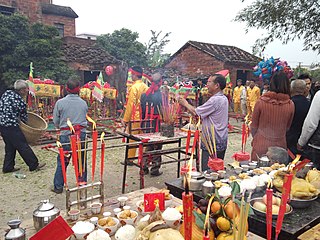 W
WBombax ceiba, like other trees of the genus Bombax, is commonly known as cotton tree. More specifically, it is sometimes known as Malabar silk-cotton tree; red silk-cotton; red cotton tree; or ambiguously as silk-cotton or kapok, both of which may also refer to Ceiba pentandra.
 W
WCantonese is a language within the Chinese (Sinitic) branch of the Sino-Tibetan languages originating from the city of Guangzhou and its surrounding area in Southeastern China. It is the traditional prestige variety of the Yue Chinese dialect group, which has over 80 million native speakers. While the term Cantonese specifically refers to the prestige variety, it is often used to refer to the entire Yue subgroup of Chinese, including related but largely mutually unintelligible languages and dialects such as Taishanese.
 W
WCantonese or Yue cuisine is the cuisine of the Guangdong province of China, particularly the provincial capital Guangzhou, and the surrounding regions in the Pearl River Delta including Hong Kong and Macau. Strictly speaking, Cantonese cuisine is the cuisine of Guangzhou or of Cantonese speakers, but it often includes the cooking styles of all the speakers of Yue Chinese languages in Guangdong. On the other hand, the Teochew cuisine and Hakka cuisine of Guangdong are considered their own styles, as is neighbouring Guangxi's cuisine despite eastern Guangxi being considered culturally Cantonese due to the presence of ethnic Zhuang influences in the rest of the province. Cantonese cuisine is one of the Eight Culinary Traditions of Chinese cuisine. Its prominence outside China is due to the large number of Cantonese emigrants. Chefs trained in Cantonese cuisine are highly sought after throughout China. Until the late 20th century, most Chinese restaurants in the West served largely Cantonese dishes.
 W
WThe Cantonese people, or Yue people, are a Yue-speaking Han Chinese sub-group originating from or residing in the provinces of Guangdong and Guangxi, in Southern Mainland China. Although more accurately, "Cantonese" refers only to the people from Guangzhou and its satellite cities and towns and/or native speakers of Standard Cantonese, rather than simply and generally referring to the people of the Liangguang region.
 W
WA karaoke box is a type of karaoke establishment commonly found in East Asia, Southeast Asia, South Asia, the United States and Canada. It originated in Japan, and is now popular worldwide, particularly in Asia. Karaoke boxes consist of multiple rooms containing karaoke equipment, usually rented out for a period of time. A typical karaoke box establishment contains 10–20 such rooms, that can be themed so that each room has a different feeling or can be a traditional karaoke box, as well as have a main karaoke bar area in the front. Karaoke box establishments often sell beverages, and sometimes food but sometimes the establishment offers free refreshments. Many people of all ages enjoy karaoke as a pastime in Japan, as it still has a huge influence in the Japanese music scene and it is also a place that can attract tourists as well. One blogger, who is a fan of karaoke, writes "...to sing karaoke is to embrace the moment that your love of song transcends your love of self." While people do go to and enjoy karaoke boxes with family and friends, people also go by themselves and are able to enjoy the comfort of performing in the room by themselves. There is also a different style of karaoke, the traditional type where the patrons sing in front of everyone that is also still offered in popular entertainment areas, rather than the private boxes.
 W
WThe Lunar New Year Fair, also known as the flower market, is a type of fair held annually a few days before Lunar New Year in Chinese New Year markets in China. These fairs are primarily practiced by the Cantonese, and spread with Cantonese immigration.
 W
W W
WA sampan is a relatively flat-bottomed Chinese and Malay wooden boat. Some sampans include a small shelter on board and may be used as a permanent habitation on inland waters. Sampans are generally used for transportation in coastal areas or rivers and are often used as traditional fishing boats. It is unusual for a sampan to sail far from land, as they do not have the means to survive rough weather.
 W
WVillain hitting, da siu yan, demon exorcising, or petty person beating, is a folk sorcery popular in the Guangdong area of China and Hong Kong—primarily associated with Cantonese. Its purpose is to curse one's enemies using magic. Villain hitting is often considered a humble career, and the ceremony is often performed by older ladies, though some shops sell "DIY" kits.